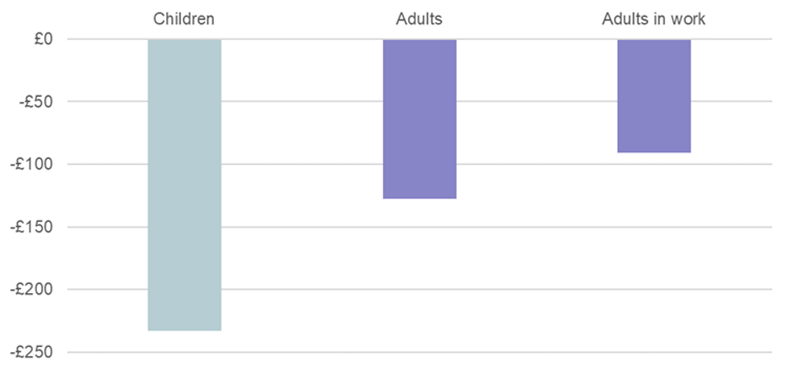Press Releases
WBG analysis finds cuts to benefits would drive over 100,000 lone parents and 200,000 children into poverty
Date Posted: Monday 10th October 2022
100,000 lone parents and 200,000 children risk being pushed into poverty by rumoured proposals to increase benefits in line with average wages instead of inflation. This would mean a cut in the value of benefits for the people who are being hardest hit by the cost of living crisis.
Real-term cuts to benefits since 2010 have already led to increasing poverty rates among lone-parent families and 49% of children of lone parents were living in poverty before the pandemic.
The Women’s Budget Group and Gingerbread are calling on the Government to follow through with the promise made by the previous chancellor to uprate benefits in line with inflation.
WBG analysis of the cut shows that:
- A further 112,000 lone parents, most of whom are women, will be pushed into poverty.
- Households headed by lone mothers stand to lose around £400 per year.
- Nearly half of children in lone parent households were already living in relative poverty.
- These cuts to benefits will result in children losing an average of £233 per year.
- Single mothers were already more likely to be skipping meals for financial reasons than couples with children.#
In addition, the Child Poverty Action Group has found that an additional 200,000 children will be pushed into poverty.
Dr Mary-Ann Stephenson, WBG Director explains:
“Women are often forced out of work or to reduce their hours because caring responsibilities disproportionately fall on them and because the childcare sector is on its knees. The lack of well-paid and flexible work forces many women to rely on benefits. We are seeing lone parent families which are largely headed by women, pushed into and further into poverty which also means an increase in child poverty.”
“Combined with tax cuts announced in the September Budget, this cut to benefits will widen inequality between rich and poor, and between men and women. On average, lone-mother households will lose £408 per year as of next April. We have already seen a dramatic increase in the use of food banks over the past year and single mothers disproportionately report cutting down or skipping meals as they cannot afford food.”
“In the middle of a cost-of-living crisis, children, lone mothers and low-income households need more support, not less, to put food on the table and heat their homes.”
Victoria Benson, CE of Gingerbread, the charity that supports single-parent families said:
“Single-parent families are already much more likely to be living in poverty and we know from calls to our helpline that there is nothing left for them to cut from household budgets. This means many are taking on expensive debt just to pay bills. I dread to think how much worse their situation will get during the colder months and with the cost of living continuing to rise.
“It’s unconscionable that this government would put more vulnerable people at risk by not uprating benefits in line with inflation. Without this financial lifeline and targeted support, it’s clear that more single parents and their children will be pushed into poverty with little hope of escape.
Figure 1: Average impact of cuts in benefits on yearly disposable income, by benefit unit, 2022 prices
Lone mother households will lose over £400 per year

Source: WBG calculations using UKMOD 3.23+ and Family Resources Survey

Figure 2: Average impact of cuts in benefits on yearly disposable income, by population group, 2022 prices
Children will lose on average £233 per year as a result of the benefit cuts
Source: WBG calculations using UKMOD 3.23+ and Family Resources Survey
Read the full briefing at: https://wbg.org.uk/analysis/who-loses-from-benefit-uprating-changes-a-gendered-analysis/
— ENDS —
About the Women’s Budget Group
The Women’s Budget Group is an independent network of leading academic researchers, policy experts and campaigners. Our vision is of a caring economy that promotes equality between women and men.
For more information or further comment, contact
Erin Mansell, Head of Communications and Public Affairs: erin.mansell@wbg.org.uk
or

